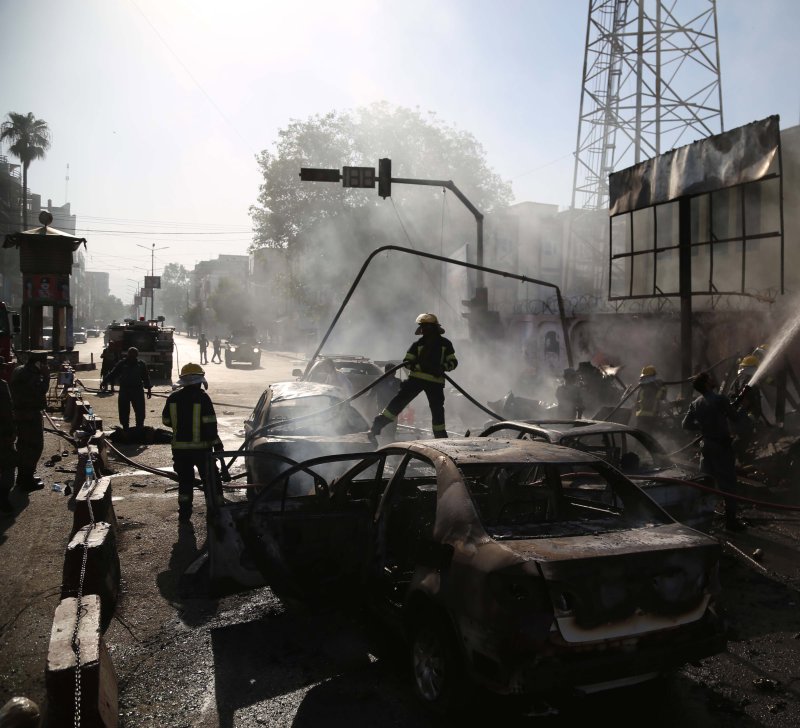Afghan firefighters work at the scene of a suicide bomb attack, in Jalalabad, Afghanistan, on July 1. Photo by Ghulamullah Habibi/EPA-EFE
July 10 (UPI) -- As the Muslim world celebrated Eid al-Fitr last month to mark the end of Ramadan, both the Afghan government and the Taliban announced temporary cease-fires to coincide with the holiday. Unfortunately, this transitory symbol of hope ignores reality: Afghans will continue killing one another into the foreseeable future.
My experience as a military commander in southern Afghanistan provided more than enough evidence for me to see why Afghanistan's endless war will continue.
The first two arguments for civil war are well established: motivation and opportunity. People rebel when sufficiently motivated by grievance or greed, and they rebel when the opportunity presents itself.
The village of Khaki Khel in 2010 brought those arguments to life. As I sat among the elders, their grievances were obvious. The Americans, along with the Afghan government, were there to apologize for the accidental deaths of two children during a military operation. Not only did the Afghan government normally fail to offer the residents any protection, but when they tried, the results were horrific. And beyond their incompetence, the Afghan government also ranks as the world's fourth most corrupt. Afghans have many reasons to hate their government.
The opportunity for rebellion typically exists when a country has ineffective security forces, recruiting rebels is easy, and rebels can readily find sanctuary. The residents of Khaki Khel rarely saw any Afghan police or soldiers and when they did, things only seemed to get worse. The fact that the villagers were subsistence farmers, eking out a living from one harvest to the next, made any financial offer from the insurgents tempting. And nearby Pakistan offered sanctuary to the rebels.
My time in Afghanistan and academic research since, however, suggests a third theory for civil war should be added: Hurt people go on to hurt people. Simply put, when a population endures epic levels of trauma like Afghanistan's 40 years of rampant war, torture, and rape, violence becomes normalized as a way to resolve problems and achieve goals. The vicious cycle feeds off of itself. More war leads to more trauma, which fuels continued war.
For example, in the midst of an argument between two senior ranking Afghan security officials, one of them unholstered his handgun and drew down on his colleague. Apparently he was ready to end the dispute by killing the fellow colonel bothering him. Thankfully, an American military commander put himself in front of the gun and succeeded in getting Col. Habib to reholster his weapon.
At that point, Col. Habib had been at war for 32 years. In a country devoid of proper medical care, he had begun self-medicating long ago and was now, we assessed, a drug addict. With all of the trauma he had endured, witnessed and meted out, it's hard to imagine that he didn't fulfill the criteria for one or more mental illnesses such as PTSD. And the ease with which he pointed a loaded firearm at another official in response to an argument suggests he suffers from diminished impulse control.
Taken together, those three features -- substance abuse, mental illness and diminished impulse control -- conspire to make an individual more violent than they would otherwise be. And Afghanistan is full of men, women and children who suffer from all three. Estimates indicate, for example, that between 20 and 50 percent of Afghans have PTSD. Opium use is widespread, and the problem drug use rate is twice the global average and climbing.
A cease-fire may sound nice to Western ears accustomed to diplomacy and democratic norms, but it only masks the country's profound problems. Chief among them, Afghanistan has become a trauma state stuck in a tragic situation where violence and trauma fuel each other.
Erik Goepner is a visiting research fellow at the Cato Institute and a doctoral candidate in the Schar School of Policy and Government at George Mason University. A retired U.S. Air Force colonel, he commanded units in Afghanistan and Iraq.















